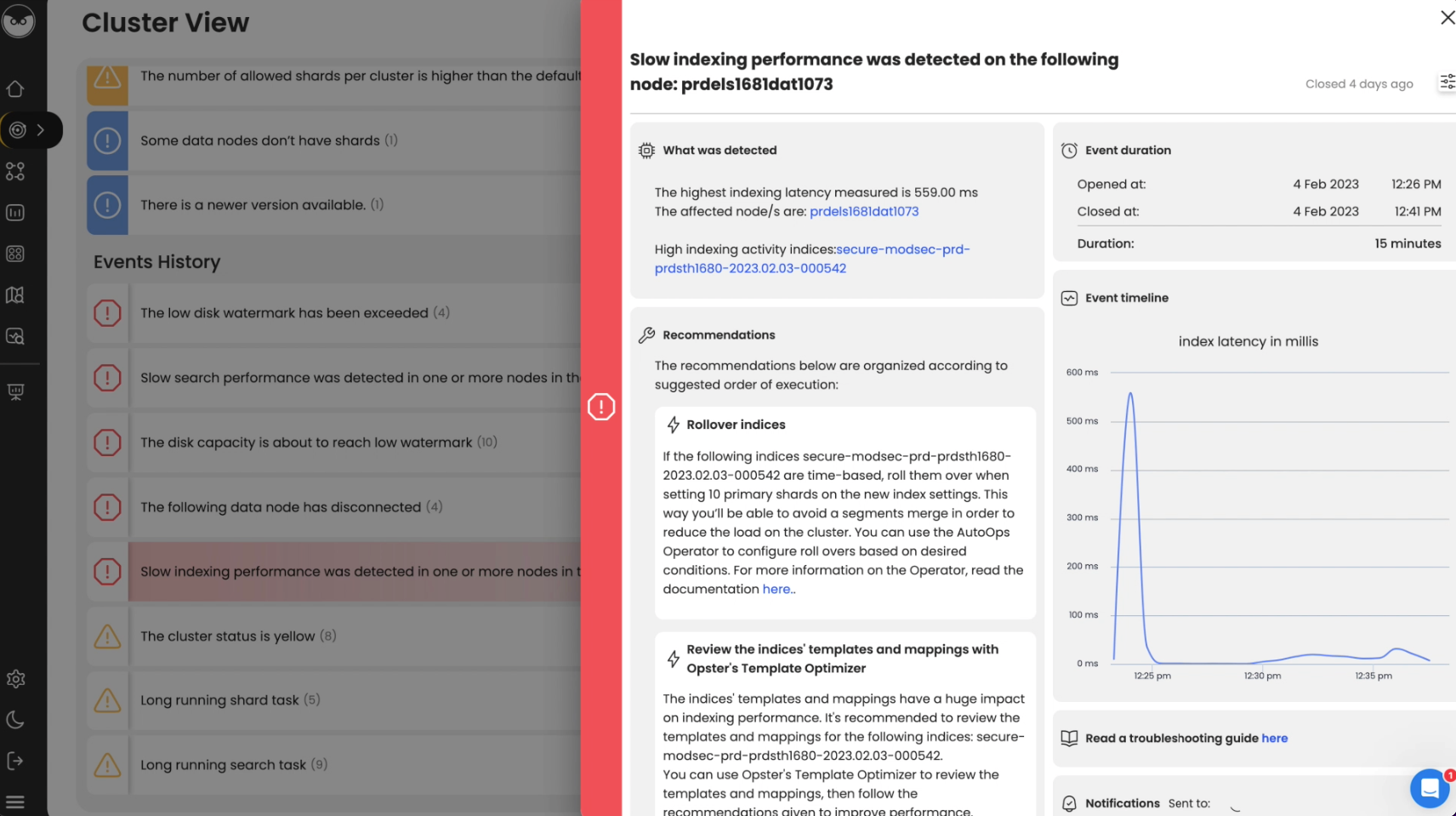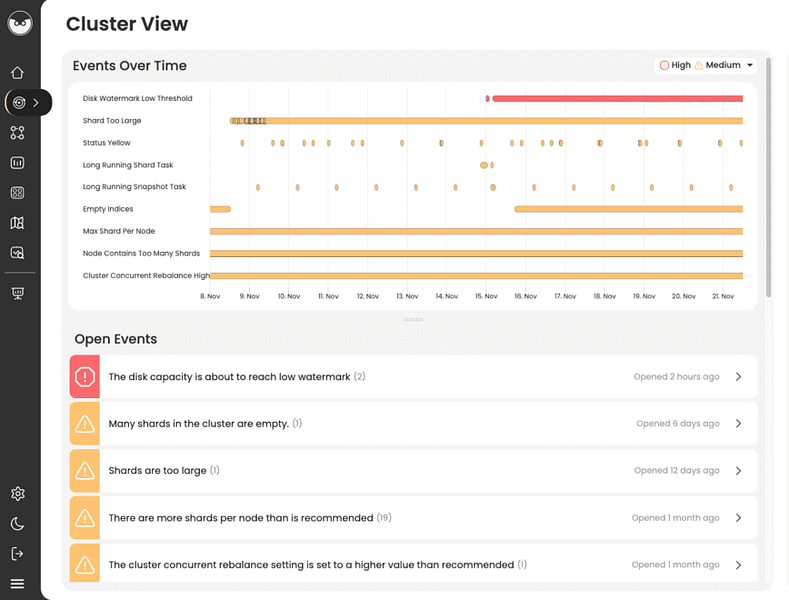Opster Team
In addition to reading this guide, we recommend you run the Elasticsearch Template Optimizer to fix problems in your data modeling.
It will analyze your templates to detect issues and improve search performance, reduce indexing bottlenecks and optimize storage utilization. The Template Optimizer is free and requires no installation.
This guide will help you check for common problems that cause the log to appear. It’s important to understand the issues related to the log, so to get started, read the general overview on common issues and tips related to the Elasticsearch concepts below. Advanced users might want to skip right to the common problems section in each concept or run the template optimizer.
What this error means
This log message is an INFO message saying that a template has been created for a given index pattern. Elasticsearch applies templates to new indices based on an index pattern that matches the index name.
Below is an example of an index template, applied only at the index creation time for all the indices matching opster-* and elastic-* pattern.
Adding template for index patterns
What are index templates?
Index templates initialize the indices with predefined mapping and settings. Templates do not affect the existing indexes, but are applied when new indices are created. Whenever we create an index that matches the corresponding template, the template will be applied and the index will have the mappings and settings defined in the template.
How to create an index template
You can create an index template as shown below that will match any indices matching the names opster-* and elastic-*.
PUT/_template/opsterelasticsearch
{
"index_patterns": [
"opster-*",
"elastic-*"
],
"mappings": {
"properties": {
"id": {
"type": "keyword"
},
"location": {
"type": "geo_point"
},
"movie": {
"type": "text"
}
}
}
}In response, you will get:
{
"acknowledged": true
}
When the index template is created, the following log is generated:
adding template [opsterelasticsearch] for index patterns [opster-*, elasticsearch-*]
Now you can create an index that will match the template’s definition and add data to it:
POST/ opster-1/_doc/1
{
"id": 158,
"location": "1.486912, 2.493157",
"movie": "Harry Potter"
}
Get a list of all the templates using:
GET / _cat/templates

Index and indexing in Elasticsearch - 3 min
Overview
In Elasticsearch, an index (plural: indices) contains a schema and can have one or more shards and replicas. An Elasticsearch index is divided into shards and each shard is an instance of a Lucene index.
Indices are used to store the documents in dedicated data structures corresponding to the data type of fields. For example, text fields are stored inside an inverted index whereas numeric and geo fields are stored inside BKD trees.
Examples
Create index
The following example is based on Elasticsearch version 5.x onwards. An index with two shards, each having one replica will be created with the name test_index1
PUT /test_index1?pretty
{
"settings" : {
"number_of_shards" : 2,
"number_of_replicas" : 1
},
"mappings" : {
"properties" : {
"tags" : { "type" : "keyword" },
"updated_at" : { "type" : "date" }
}
}
}List indices
All the index names and their basic information can be retrieved using the following command:
GET _cat/indices?v
Index a document
Let’s add a document in the index with the command below:
PUT test_index1/_doc/1
{
"tags": [
"opster",
"elasticsearch"
],
"date": "01-01-2020"
}Query an index
GET test_index1/_search
{
"query": {
"match_all": {}
}
}Query multiple indices
It is possible to search multiple indices with a single request. If it is a raw HTTP request, index names should be sent in comma-separated format, as shown in the example below, and in the case of a query via a programming language client such as python or Java, index names are to be sent in a list format.
GET test_index1,test_index2/_search
Delete indices
DELETE test_index1
Common problems
- It is good practice to define the settings and mapping of an Index wherever possible because if this is not done, Elasticsearch tries to automatically guess the data type of fields at the time of indexing. This automatic process may have disadvantages, such as mapping conflicts, duplicate data and incorrect data types being set in the index. If the fields are not known in advance, it’s better to use dynamic index templates.
- Elasticsearch supports wildcard patterns in Index names, which sometimes aids with querying multiple indices, but can also be very destructive too. For example, It is possible to delete all the indices in a single command using the following commands:
DELETE /*
To disable this, you can add the following lines in the elasticsearch.yml:
action.destructive_requires_name: true
Overview
Metadata in Elasticsearch refers to additional information stored for each document. This is achieved using the specific metadata fields available in Elasticsearch. The default behavior of some of these metadata fields can be customized during mapping creation.
Examples
Using _meta meta-field for storing application-specific information with the mapping:
PUT /my_index?pretty
{
"mappings": {
"_meta": {
"domain": "security",
"release_information": {
"date": "18-01-2020",
"version": "7.5"
}
}
}
}Notes
- In version 2.x, Elasticsearch had a total 13 meta fields available, which are: _index, _uid, _type, _id, _source, _size, _all, _field_names, _timestamp, _ttl, _parent, _routing, _meta
- In version 5.x, _timestamp and _ttl meta fields were removed.
- In version 6.x, the _parent meta field was removed.
- In version 7.x, _uid and _all meta fields were removed.
Log Context
Log “Adding template [{}] for index patterns {}” classname is MetaDataIndexTemplateService.java.
We extracted the following from Elasticsearch source code for those seeking an in-depth context :
}
IndexTemplateMetaData template = templateBuilder.build();
MetaData.Builder builder = MetaData.builder(currentState.metaData()).put(template);
logger.info("adding template [{}] for index patterns {}"; request.name; request.indexPatterns);
return ClusterState.builder(currentState).metaData(builder).build();
}
Override
public void clusterStateProcessed(String source; ClusterState oldState; ClusterState newState) {
Find & fix Elasticsearch problems
Opster AutoOps diagnoses & fixes issues in Elasticsearch based on analyzing hundreds of metrics.
Fix Your Cluster IssuesConnect in under 2 minutes

Jose Rafaelly
Head of System Engineering at Everymundo





